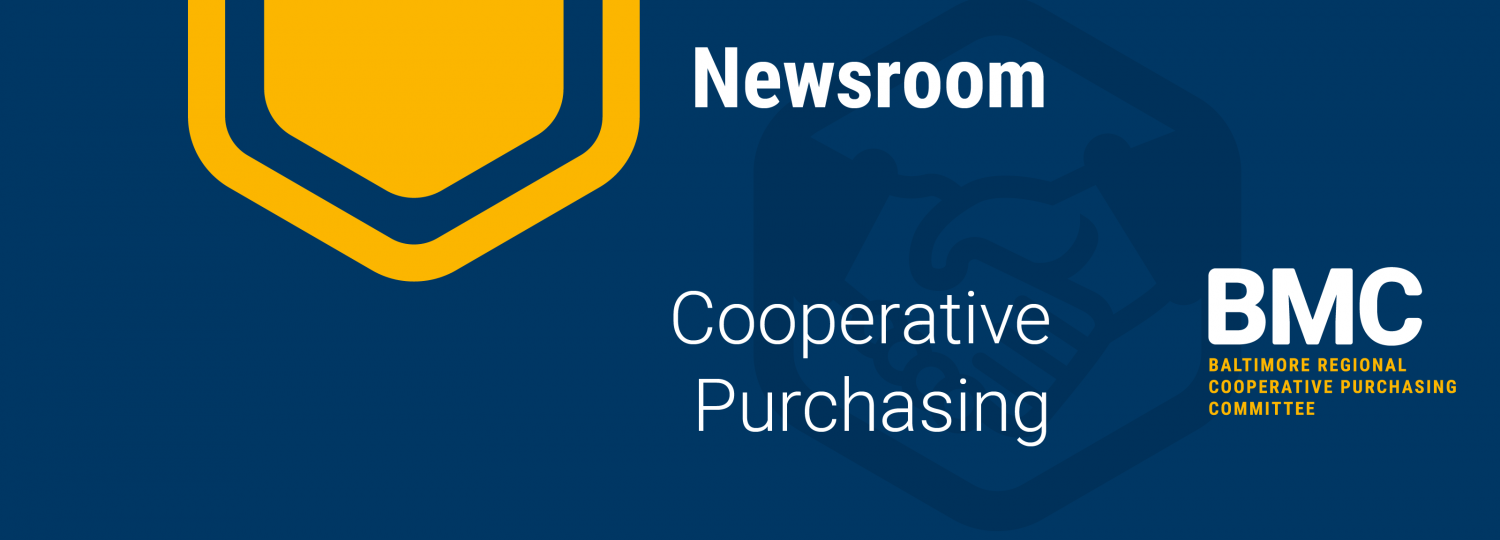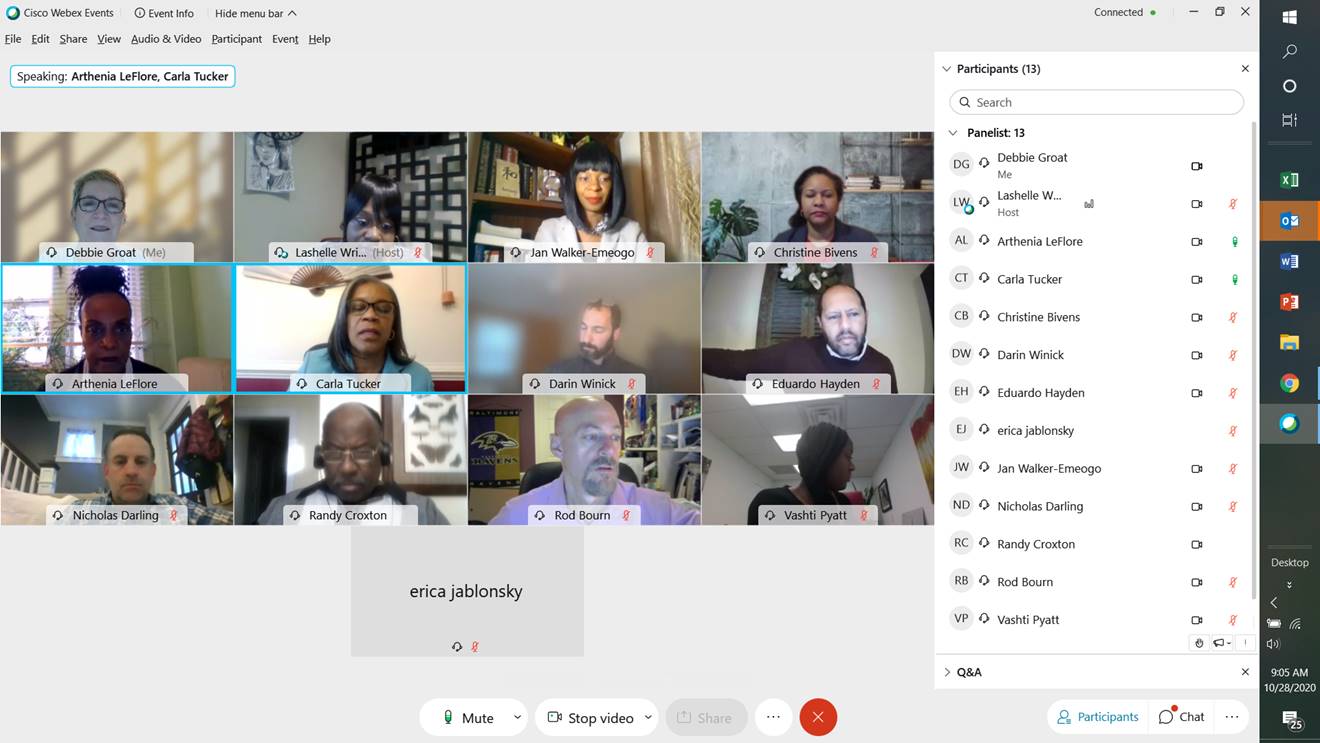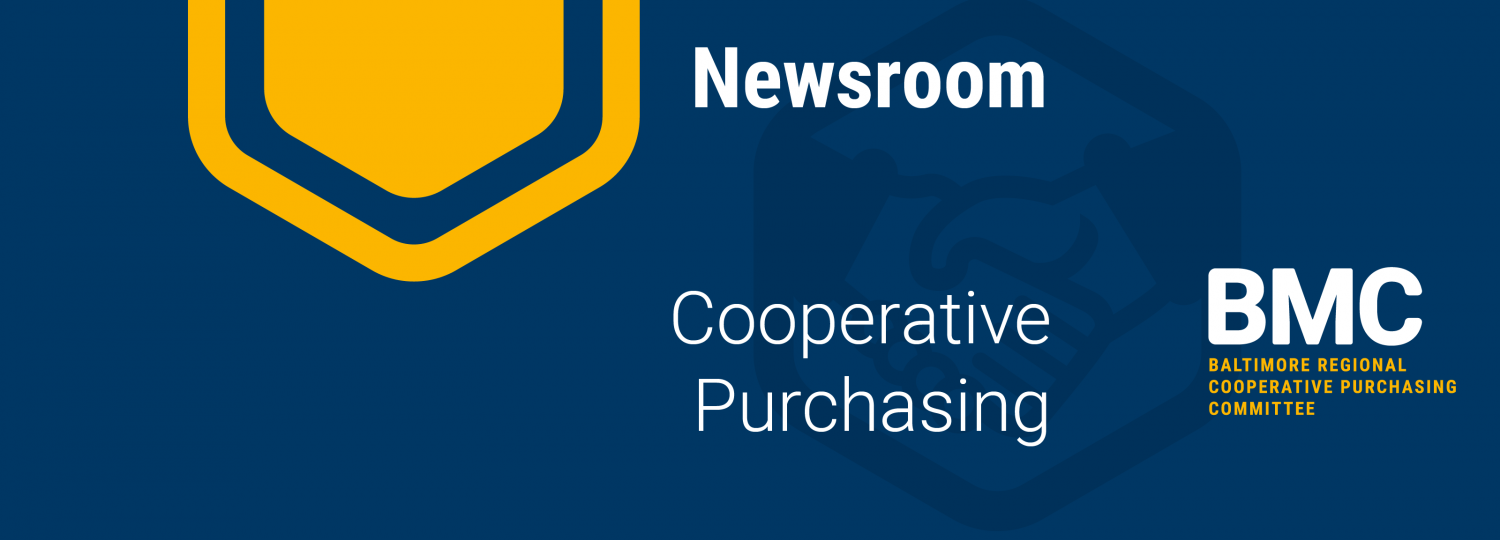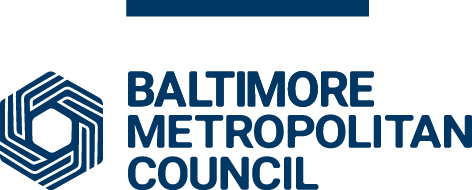
BALTIMORE, MD (Wednesday, January 31, 2024) – The Baltimore Regional Cooperative Purchasing Committee (BRCPC) is launching an open database of regional contracts, making details about the group’s high-volume purchasing of commodities and services accessible to the public.
Supported by Baltimore Metropolitan Council (BMC), the BRCPC provides a forum for state and local governments, public schools, community colleges, nonprofits and other agencies to buy in bulk, leveraging their collective purchasing power to secure better rates and save millions on expenditures such as energy, vehicles, office furniture, software and services like daycare.
BRCPC members previously maintained an internal database with thousands of vendors. Now, anyone can access the resource online via baltometro.org/member-portal/regional-purchasing-database.
“Our members use the database daily,” said Debbie Groat, BMC’s cooperative purchasing coordinator. “It has become an essential tool in the region, and by making it public-facing, it can act as a trusted resource for government officials and suppliers alike.”
The database grew organically over time, and committee members decided last year to open up the resource to help more purchasers throughout the region find cooperative contracting and bidding opportunities. BMC will update the database twice a year.
“We’re excited to share this tool with the Baltimore region,” said BMC Executive Director Mike Kelly. “It will serve as a powerful resource for connecting bidding opportunities and vendors.”
Kelly noted that many of BRPCP members are public agencies, meaning that money saved on these bulk contracts frees up funding for public services. The collaborations fostered through the BRCPC help taxpayers save on huge line items like electricity for public schools. Last year, the BRCPC’s Energy Board saved $73.6 million on energy compared to BGE’s standard rates, and has saved more than $290 million on energy since launching in 2007.
Learn more about the BRCPC and check out the regional contract database at baltometro.org/member-portal/regional-purchasing-database or by emailing Debbie Groat at dgroat@baltometro.org.
###
Baltimore Metropolitan Council provides a regional forum for members, state and local partners to identify mutual interests and collaborate on strategies, plans and programs that help improve economic vitality and quality of life for all.
BMC operates its programs and services without regard to race, color or national origin in accordance with Title VI of the Civil Rights Act of 1964 and other applicable laws. Appropriate services can be provided to qualified individuals with disabilities or those in need of language assistance who submit a request at least seven days prior to a meeting. Call 410- 732-0500. Dial 7-1-1 or 800-735-2258 to initiate a TTY call through Maryland Relay. Si se necesita información de Título VI en español, llame al 410-732-0500.
Users Guide for Cooperative Purchasing - BRCPC
Users Guide for Cooperative Purchasing - BRCPC

Baltimore County and the Baltimore Metropolitan Council host the 13th Annual Meet the Primes Virtual event on Wednesday, October 13th, 2021, where small and minority owned businesses (MBE/SBE) are connected with prime contract bidders.
The event provides a chance for attendees to speak directly with a representative from a prime company or government agency that has identified sub-contracting needs for their current and upcoming projects.
Over 60 exhibitors attended this event.
The virtual event also hosted breakout sessions giving exhibitors the opportunity to hold discussions away from the group meeting. This allows businesses the opportunity to pick which exhibitors they would like to hear from, similar to visiting a booth at a physical event.
This event continues to empower those in our region to build new partnerships and access the buying capacity of our governments.

On Wednesday, October 28, 2020, The Baltimore Metropolitan Council’s (BMC) Baltimore Regional Cooperative Purchasing Committee (BRCPC) co-hosted the 12th Annual Meet the Primes event. This virtual procurement outreach event connects small and minority owned businesses (MBE/SBE) to prime contract bidders.
The event welcomed over 500 small and minority business participants.
Organized by Baltimore County, Meet the Primes utilized virtual training and presentation sessions to provide information to attendees. Participants reviewed updates in the financial systems for solicitations, submitting bids and obtaining purchase orders for new and existing vendors, as well as hosted discussions for potential vendors to learn about the various business resources including the BRCPC.
Small business representatives also met with select government agencies and prime companies during pre-scheduled one-to-one introduction meetings. These meetings presented opportunities for attendees to present their products and services directly to the procurement officials, buyers and decision makers who may be interested in their offerings.
In addition to the one-to-one sessions and virtual training and presentation sessions, the event also utilized business listings to display contact information creating a database of participating small and minority owned businesses.
This event presents unique opportunities for small and minority owned businesses, empowering those in our region to build new partnerships and access the buying capacity of our governments.
We are hopeful that we can return in-person for next year’s Meet the Primes event, scheduled for Wednesday, October 13, 2021.
 |

The COVID-19 pandemic continues to keep us apart. Many are staying at home, socially distancing and using personal protection equipment (PPE) when venturing out.
PPE has played a huge role in the response to the health crisis. Procuring this equipment during a time when supply was very low and demand was exponential has been a challenge that many experienced worldwide.
BMC's Director of Cooperative Purchasing, Debbie Groat, takes a deeper look at the supply chain for PPE, underscoring how it has changed throughout the pandemic. She also calls for the stabilization of a pricing structure for such material in an article she wrote for the MPAA Newsletter.
Read the article here:
Handling Price Escalators in an unstable supply chain
Escalators are used to encourage suppliers to participate in long-term contracts when price volatility would otherwise discourage participation with aggressive pricing. Escalators have been useful for a variety of reasons, such as fuel prices, trade tariffs, and under COVID19 where we have supply chain collapse due to soaring global demand for Personal Protection Equipment (PPE) and shortages in raw materials needed to manufacturer the PPE supplies. 3M’s N95 facemask that was normally priced between $0.50 - $0.60 each were coming in at the peak of COVID19 between $5.00 and $6.00. Standard fixed price contracting was out the door.
As emergency contracting begins to wane, we need competitive solutions for PPE requirements in the future. Based on the undependable supply chain during COVID19, a good price escalation clause and cooperative purchasing should be the procurement strategy that will garner the best pricing. The National Institute of Governmental Purchasing defines the Price Adjustment Clause:
“A clause in a contract allowing for adjustment in price in accordance with circumstances arising during the term of the contract. A provision that must be included in contracts requiring contractor certification of cost and pricing data stating that price, including profit or fee, shall be adjusted to exclude any significant sums by which the jurisdiction finds the price was increased because the contractor-furnished cost or pricing data was inaccurate, incomplete, or not current.”
This kind of clause requires thoughtful development and management to ensure an equitable contract. It also means that price adjustments are considered for escalation and de-escalation. While it may be more effort to maintain a contract with a price adjustment clause, it’s rewarded with more competition and competitors that give you their best price at the time of bid. Competitors are encouraged to give their best price because you have reduced some of the risk in bidding a long-term contract in a volatile market, such as PPE supplies. The following is an example of price adjustment clause considerations taken from the Federal Acquisition Department:
2-18.5 Fixed-Price Contract with Economic Price Adjustment
A fixed-price contract with economic price adjustment provides for upward and downward revision of the stated contract price upon the occurrence of specified contingencies. This type of contract establishes a basis for measuring fluctuations so that price adjustments are limited to contingencies beyond the supplier’s control and reflect actual market fluctuations. Upward adjustments are limited by establishing a reasonable ceiling, and provisions are included for downward adjustments when prices or rates fall below base levels established in the contract.
There are two types of economic price adjustments:
- Adjustments based on ACs of labor or materials — price adjustments based on actual increases or decreases in the costs of specified labor or materials during performance.
- Adjustments based on cost indexes of labor or materials — price adjustments based on increases or decreases in labor or material cost standards or indexes specifically identified in the contract.
Fixed-price contracts with economic price adjustment are appropriate when there is serious doubt about the stability of market or labor conditions during an extended period of performance and when contingencies that would otherwise be included in a FFP contract are identifiable and can be covered separately in the contract. Their usefulness is limited by the difficulties of administering them.
Fixed-price contracts providing for an economic price adjustment based on ACs of labor or materials must include Clause 2-28: Economic Price Adjustment — Labor and Materials, and fixed-price contracts providing for an economic price adjustment based on cost indexes of labor or materials must include Clause 2-29: Economic Price Adjustment (Index Method).”
The main reason for using a price adjustment clause is to discourage the bidder from setting their price high enough to offset any expected or unexpected future increases that are out of their control. COVID19 has raised a bidder’s concern over their ability to predict the “unexpected increases.” A best practice to drive your PPE bid prices down is to aggregate as much volume as possible through cooperative purchasing and use a price adjustment clause when it is reasonable to do so. An example of a Federal price adjustment clause is found in the Reference section below. Why Federal you ask? Well, since much of the PPE we are purchasing under COVID19 may be reimbursable by the Federal Government, it may be good to see what type of clause they find acceptable should we find ourselves in a similar situation in the future.
One final note about price adjustment clauses. Do not confuse the COVID19 market circumstances with your force majeure clause, that is normally used as protection against natural disasters or other catastrophes as most recently seen in the explosion in Beirut. Price adjustment clauses are needed for things such as tariffs and COVID19 supply chain collapse.
Debbie Groat, Chair
MPPA Cooperative Purchasing Subcommittee
Reference:
- https://www.fhwa.dot.gov/programadmin/contracts/ta50803.cfm
- https://www.nigp.org/docs/default-source/docs/education/OnlineDict/DictP.htm
- https://www.acquisition.gov/content/52216-4-economic-price-adjustment-labor-and-material Found below:
Economic Price Adjustment-Labor And Material (Jan 2017)
(a) The Contractor shall notify the Contracting Officer if, at any time during contract performance, the rate of pay for labor (including fringe benefits) or the unit prices for material shown in the Schedule either increase or decrease. The Contractor shall furnish this notice within 60 days after the increase or decrease, or within any additional period that the Contracting Officer may approve in writing, but not later than the date of final payment under this contract. The notice shall include the Contractor’s proposal for an adjustment in the contract unit prices to be negotiated under paragraph (b) of this clause, and shall include, in the form required by the Contracting Officer, supporting data explaining the cause, effective date, and amount of the increase or decrease and the amount of the Contractor’s adjustment proposal.
(b) Promptly after the Contracting Officer receives the notice and data under paragraph (a) of this clause, the Contracting Officer and the Contractor shall negotiate a price adjustment in the contract unit prices and its effective date. However, the Contracting Officer may postpone the negotiations until an accumulation of increases and decreases in the labor rates (including fringe benefits) and unit prices of material shown in the Schedule results in an adjustment allowable under paragraph (c)(3) of this clause. The Contracting Officer shall modify this contract (1)to include the price adjustment and its effective date and (2)to revise the labor rates (including fringe benefits) or unit prices of material as shown in the Schedule to reflect the increases or decreases resulting from the adjustment. The Contractor shall continue performance pending agreement on, or determination of, any adjustment and its effective date.
(c) Any price adjustment under this clause is subject to the following limitations:
(1) Any adjustment shall be limited to the effect on unit prices of the increases or decreases in the rates of pay for labor (including fringe benefits) or unit prices for material shown in the Schedule. There shall be no adjustment for-
(i) Supplies or services for which the production cost is not affected by such changes;
(ii) Changes in rates or unit prices other than those shown in the Schedule; or
(iii) Changes in the quantities of labor or material used from those shown in the Schedule for each item.
(2) No upward adjustment shall apply to supplies or services that are required to be delivered or performed before the effective date of the adjustment, unless the Contractor’s failure to deliver or perform according to the delivery schedule results from causes beyond the Contractor’s control and without its fault or negligence, within the meaning of the Default clause.
(3) There shall be no adjustment for any change in rates of pay for labor (including fringe benefits) or unit prices for material which would not result in a net change of at least 3 percent of the then-current total contract price. This limitation shall not apply, however, if, after final delivery of all line items, either party requests an adjustment under paragraph (b) of this clause.
(4) The aggregate of the increases in any contract unit price made under this clause shall not exceed 10 percent of the original unit price. There is no percentage limitation on the amount of decreases that may be made under this clause.
(d) The Contracting Officer may examine the Contractor’s books, records, and other supporting data relevant to the cost of labor (including fringe benefits) and material during all reasonable times until the end of 3 years after the date of final payment under this contract or the time periods specified in subpart 4.7 of the Federal Acquisition Regulation (FAR), whichever is earlier.
BRTB Agenda - Sep 22, 2020
BRTB Agenda - Sep 22, 2020

The Baltimore Regional Cooperative Purchasing Committee (BRCPC) coordinated with the Metropolitan Washington Council of Governments (MWCOG) to participate in the largest cooperative purchase of N95 masks in the Mid-Atlantic region. N95 masks are those recommended for use by medical and emergency professionals to prevent the transmission of infectious disease. These masks have come into increasingly high demand during the current COVID-19 pandemic. Led by MWCOG, this bulk purchase of 7.1 million masks covers the requirements for 30 governmental entities across Maryland, Virginia and the District of Columbia.
During a time when so much of the world is facing COVID-19 and the increasing measures to protect themselves, demand for personal protection equipment (PPE) has risen well above available supply. The aggregate volume of this order helped MWCOG and BRCPC to secure these essential resources despite competition from across the country and the globe.
In addition to this important effort, purchasers, governments, private industry and individuals have taken novel approaches to secure the resources our region needs. Here are a few clever and inventive local examples:
- Distilleries have converted their operations to make hand sanitizer until the normal manufacturers of hand sanitizer could catch up with demand
- Textile companies have made gowns and masks for medical personnel at the request of local leaders
- Supplies of gowns and masks were found through coordination with promotional supply companies
- Local EMS providers have spared gloves, masks and wipes
- Local firms have donated materials, including gloves from tattoo shops and masks from gas equipment suppliers
- Local firms have donated warehousing to store bulk shipments of PPE supplies
- Purchasers have worked with promotional supply houses to vet foreign offers for N95 masks to ensure their legitimacy
- Cooperative purchasing is being used to aggregate the volume of orders to ensure we get the attention of manufacturers and competitive pricing
- Individuals are sewing masks at home to fill gaps for their communities
Regional procurement professionals and their partners in the manufacturing and supply sector have shined in this challenging time. We are proud to share that their cooperation is helping to save lives.

